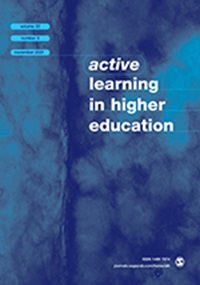Students with low prior knowledge learn more when explaining to a peer than to a teacher after viewing educational videos
IF 3.2
1区 教育学
Q1 EDUCATION & EDUCATIONAL RESEARCH
引用次数: 0
Abstract
Students are often encouraged to explain recently-taught information to others to enhance their learning in various settings including face-to-face in the classroom, through text, or in educational videos. However, nearly all studies on the impact of explaining things to others have focused on the effects of explaining to a less-knowledgeable peer, and have not considered the students’ own prior knowledge. The current study tested the interaction effects of students’ prior knowledge and the social identity of their audience on the students’ learning via explaining their new knowledge to others after viewing educational videos. We observed interaction effects on immediate learning performance, monitoring accuracy, and theta power while the students both watching videos and prepared to explain, but not on delayed learning performance or motivation. The current study highlights the fact that students with low prior knowledge learn more from an educational video when explaining the lesson to a peer than they do when explaining to a teacher after viewing. Our findings have implications on learning strategies which can be adopted when using educational videos in educational settings, specifically that students, especially those with low prior knowledge, should be encouraged to generate explanations of the lesson to share with their peers rather than with their teachers, as this will better enhance their working memory activity as they prepare to explain the educational videos.先验知识少的学生在观看教育视频后,向同伴讲解比向老师讲解学到的更多
人们经常鼓励学生向他人解释最近教授的信息,以提高他们在各种场合的学习效果,包括在课堂上面对面地讲解、通过文本或教育视频讲解。然而,几乎所有关于向他人讲解的影响的研究都集中在向知识水平较低的同伴讲解的效果上,而没有考虑到学生自身的已有知识。本研究测试了学生的已有知识和观众的社会身份对学生在观看教育视频后通过向他人讲解新知识进行学习的交互影响。我们观察到学生在观看视频并准备讲解时,其即时学习成绩、监测准确性和θ功率都会受到交互影响,但延迟学习成绩或学习动机则不会受到影响。本研究强调了这样一个事实:与观看视频后向老师讲解相比,先验知识较少的学生在向同伴讲解课程时能从视频中学到更多。我们的研究结果对在教育环境中使用教育视频时可采取的学习策略有一定的启示,特别是应鼓励学生,尤其是那些先前知识水平较低的学生,在准备讲解教育视频时生成课程讲解内容与同伴分享,而不是与老师分享,因为这将更好地增强他们的工作记忆活动。
本文章由计算机程序翻译,如有差异,请以英文原文为准。
求助全文
约1分钟内获得全文
求助全文
来源期刊

Active Learning in Higher Education
EDUCATION & EDUCATIONAL RESEARCH-
CiteScore
13.20
自引率
12.00%
发文量
31
期刊介绍:
Active Learning in Higher Education is an international, refereed publication for all those who teach and support learning in higher education (HE) and those who undertake or use research into effective learning, teaching and assessment in universities and colleges. The journal is devoted to publishing accounts of research covering all aspects of learning and teaching concerning adults in higher education. Non-discipline specific and non-context/country specific in nature, it comprises accounts of research across all areas of the curriculum; accounts which are relevant to faculty and others involved in learning and teaching in all disciplines, in all countries.
 求助内容:
求助内容: 应助结果提醒方式:
应助结果提醒方式:


